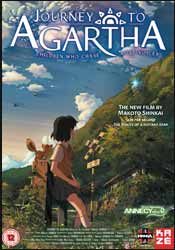|
Click here to return to the main site. DVD Review
When she hears a strange song from a crystal radio, Asuna tunes into more than just a magical stream of music. Soon, she is transported to a mysterious world where mythical beasts roam and brave warriors fight for their lives. Agartha is a land of breathtaking beauty and unimaginable danger - a place where, it is believed, even the dead can be brought back to life. But at what cost...? Makoto Shinkai is an unusual figure in the studio-bound, highly collaborative world of the Japanese animation industry. Beginning with his early short works She And Her Cat (1999) and Voices Of A Distant Star (2002), his features to date have been fully self-produced, Shinkai creating everything from script to storyboarding, animation and music. Even with the success of his next feature The Place Promised in Our Early Days (2004), Shinkai continued this approach with 2007's 5cm Per Second; now with Children Who Chase Lost Voices From Deep Below, to use his new movie's full title, he seems to have decided to embrace collaborative work fully and aim for a bona fide international success. In pursuit of this goal, Shinkai's latest film plays out like an overt tribute to the fantasy movies of Hayao Miyazaki, so much so that it's difficult to judge the film on its own merits. Certainly the story has plenty of thematic and mythological resonance, with the underworld kingdom of Agartha, sealed off from the surface world and edging gradually towards decay, standing at once for a multiplicity of ideas. Agartha is not merely an 'other world' of fantasy accessed through scientific or supernatural means, but a land populated by uncanny liminal beasts - threatening, helpful or simply indifferent - where the secret of reviving the dead may be found. Eliding concepts of subterranean realms from various worldwide mythologies in this way, Shinkai adds more to the stew with the depiction of Agartha as a hidden kingdom whose riches have been plundered by greedy surface dwellers across the ages; boy hero Shin and his people, together with the territory in which they live, evoke the culture of Tibet and Nepal in their appearance, playing into popular mystical fantasies of those countries. Japanese, Indian, and Greco-Roman mythologies all feed in to the mix, yet the result, although occasionally heady and spectacular, is somewhat diffuse and lacking in conceptual strength. The characterisation, too, leaves something to be desired. Young heroine Asuna is clearly patterned after the earnest girl heroines of Miyazaki's most famous works, yet her character is underwritten, with neither her attraction to Agarthan interloper Shun or his successor Shin adding up to much; her relationships with her deceased father and hard-working mother, too, never really take flight. Shin is a rather bland young hero too, and the narrative's most intriguing figure, the ruthless explorer Morisaki, is an ambiguous antagonist who might have made for a more interesting film were his to have been the central role. In his single-minded determination to uncover Agartha's divine mysteries for the goal of reunion with his late wife, Morisaki resembles a more sympathetic take on Evangelion's arch-villain Gendo Ikari and is undoubtedly the best-written character in the film. While Journey to Agartha is a gorgeous spectacle, with superb backgrounds and music and some fine animation, the overwhelming debt to Miyazaki and unfocused story leave it a frustrating promise of what could have been the next big step in the undeniably talented Shinkai's career. In the DVD bonus material Shinkai describes the story's origins in his time spent in the Middle East and London, and his wish to create something more accessible to an international audience than his previous works; at a time when the anime industry is diminishing in scope and seemingly only interested in catering to Japan's diehard otaku fanbase, his outward-looking perspective and ambition are just what the medium needs. Journey to Agartha is a lovely-looking film, yet perhaps not the sweeping achievement its creator was hoping for. 6 Richard Hunt |
|---|

